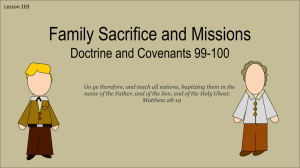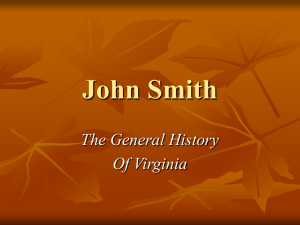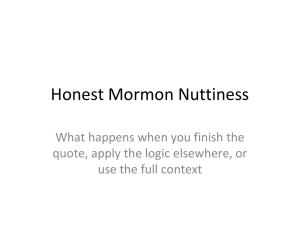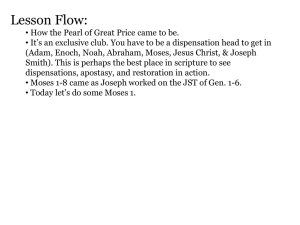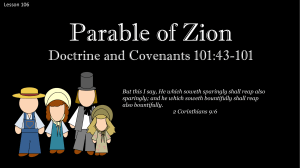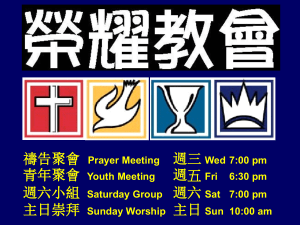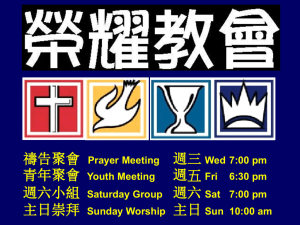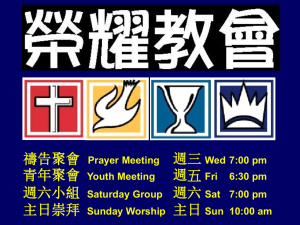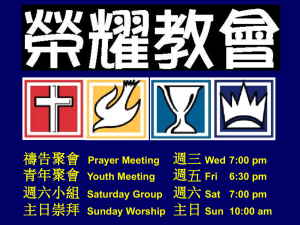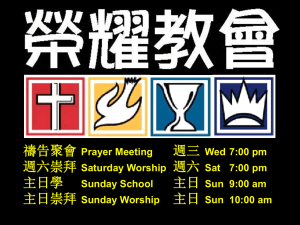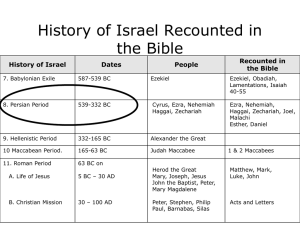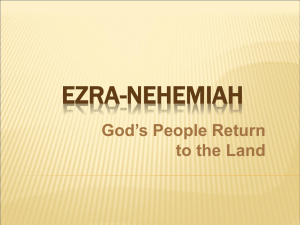Lesson-75-DC-69-71-The-Lords
advertisement
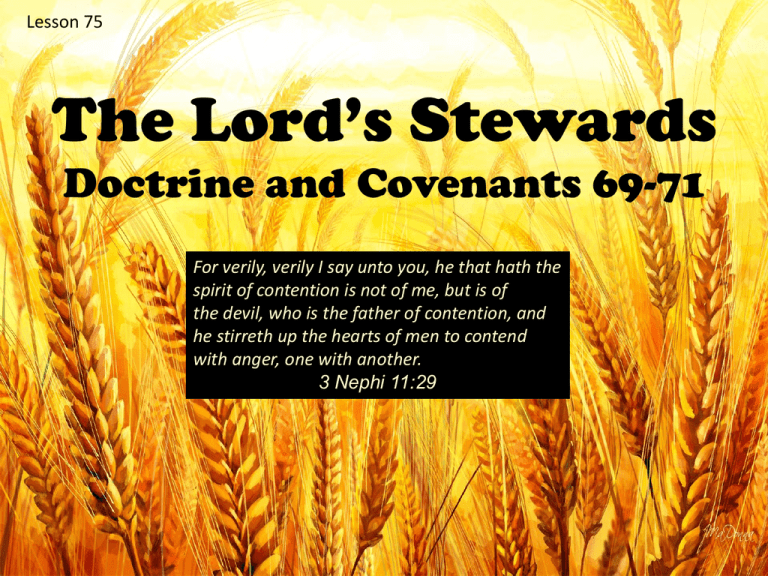
Lesson 75 The Lord’s Stewards Doctrine and Covenants 69-71 For verily, verily I say unto you, he that hath the spirit of contention is not of me, but is of the devil, who is the father of contention, and he stirreth up the hearts of men to contend with anger, one with another. 3 Nephi 11:29 Background November 1831 Each of the revelations selected for that volume was placed there because the Prophet considered that it had some value to the Church in regard to its teachings. There are some revelations still in possession of the Church which were not included. Some of these we can readily believe were not included because the inspiration of the Prophet was that it was not necessary, or because some of them had an application which was not intended for publication and to be sent to an unbelieving world. HC The Prophet Joseph Smith stated, “the Book of Commandments and Revelations was to be dedicated by prayer to the service of Almighty God by me; and after I had done this, I inquired of the Lord concerning these things, and received the following (Section 69): Something of Value The Lord appoints John Whitmer to accompany Oliver Cowdery in delivering the manuscripts to Missouri where William W. Phelps would print them. They left on 20 November, tarried a week in Winchester, Indiana, and arrived in Independence on 5 January 1832 John Whitmer was to continue as Church Historian (D&C 47:2) Manuscripts— The Book of Commandments A compilation of revelations received by the Prophet Joseph Smith D&C 69:1-3 Historical Records “The historical records of the church are exceeding valuable documents, and, as years go by, they increase in value to the entire world. In the Records of the Church historians will always be found reliable sources of information concerning the Church.” “Other historians either ignore the Church or write about it from a prejudiced, or even hostile, point of view.” When reading on the internet or other sources of Church History your best bet whether it is true or false will come to you as a witness through the Holy Ghost Smith and Sjodahl “If every elder had, during the last nineteen years kept a faithful record of all that he had seen, heard, and felt of the goodness, wisdom and power of God, the Church would now have been in possession of many thousand volumes, containing much important and useful information. How many thousands have been miraculously healed in this Church, and yet no one has recorded the circumstances. Is this right? Should these miraculous manifestations of the power of God be forgotten and pass into oblivion? Should the knowledge of these things slumber in the hearts of those who witnessed them? … We should keep a record because Jesus has commanded it. We should keep a record because the same will benefit us and the generations of our children after us. We should keep a record because it will furnish many important items for the general history of the Church which would otherwise be lost.” Orson Pratt Joseph Smith’s first Journal If Only: If there had been a better record keeping system there would be more information If there had been more people on the earth who wrote about their experiences there would be more information If there had been a better way to preserve the records there would be more information “The people of the northern kingdom that were taken away never returned to reclaim their land, and eventually they became the “lost tribes”—that is, lost to the record-keepers of Judah.” John Tvedtnes But they taught them that they should keep their record, and that they might write one to another. Mosiah 24:6 The only way we are going to know the truth is if we record it ourselves The more witnesses of the truthfulness of the Gospel, the more “convincing” the Gospel will be A Steward Stewardship is not ownership. Stewardship is management with a responsibility to account to the owner or master. The basic principle was taught by the Lord when He said: “I, the Lord, stretched out the heavens, and built the earth, my very handiwork; and all things therein are mine. … Behold, all these properties are mine, … and if the properties are mine, then ye are stewards; otherwise ye are no stewards.” D&C 70:1-5 Student Manual Temporal Needs The brethren who were given the stewardship of the revelations to be published were to receive their livelihood from the proceeds. The law of consecration included temporal needs as well as spiritual needs. “According to the Law of God all share alike; one who administers in spiritual things is “worthy of his hire’ equal with one who manages some business, though the world generally rates business ability higher that spiritual excellence. “In your temporal things you shall be equal” Smith and Sjodahl D&C 70:6-14 Equal The dictionary defines equal as being of the same quantity, size, number, value, degree, or intensity. The Lord, however, does not endorse such a definition in His gospel. “To be equal did not mean that all should have the same amount of food, but each should have according to his needs. For instance, a man would receive in proportion to the number in his family, not according to the nature of his work. He was to have, ‘for food and for raiment; for an inheritance; for houses and for lands, in whatsoever circumstances, I the Lord, shall place them, and whithersoever I, the Lord, shall send them.’” President Joseph Fielding Smith D&C 70:14 Reward For Diligence God’s willingness to bless them wit temporal blessings, as well as spiritual Those who can enjoy heaven can enjoy the Earth, also. D&C 70:15-17 Smith and Sjodahl Expounding Mysteries December 1831—Hiram, Ohio “A mystery is a truth that cannot be known except through divine revelation—a sacred secret. … In our day such great truths as those pertaining to the restoration of the priesthood, the work for the dead, and the re-establishment of the Church are ‘mysteries,’ because they could not have been discovered except by revelation.” (Smith and Sjodahl, Commentary, p. 141.) D&C 71:1-4 Critics of the Church December 1831—Hiram, Ohio “The most effective way to defend the Gospel is to declare it.” “Falsehood cannot hold its own against the truth in open display, the ministers of darkness of necessity must first shade or distort the light of heaven.” D&C 71:7 McConkie and Ostler The Ohio Star Ezra Booth published some anti Mormon literature Symonds Ryder also sent other articles to other magazines criticizing the Church and Joseph Smith Sidney Rigdon obeyed the Lord’s counsel and invited Ezra Booth to join him in the town of Ravenna, where they would publicly discuss the letters Ezra had sent to the newspaper. Sidney also challenged Symonds Ryder to a public debate on the Book of Mormon. Both men declined the invitations. Sidney still testified of the truth in Ravenna and other locations. When people criticize the church, we can respond by sharing truths from the scriptures and following the guidance of the Spirit “As we respond to others, each circumstance will be different. Fortunately, the Lord knows the hearts of our accusers and how we can most effectively respond to them. As true disciples seek guidance from the Spirit, they receive inspiration tailored to each encounter. And in every encounter, true disciples respond in ways that invite the Spirit of the Lord” Elder Robert D. Hales D&C 71:7-10 “As true disciples, our primary concern must be others’ welfare, not personal vindication. Questions and criticisms give us an opportunity to reach out to others and demonstrate that they matter to our Heavenly Father and to us. Our aim should be to help them understand the truth, not defend our egos or score points in a theological debate. Our heartfelt testimonies are the most powerful answer we can give our accusers. And such testimonies can only be borne in love and meekness” Elder Robert D. Hales “Probably we will never be free of those who are openly anti-Mormon. Therefore, we encourage all our members to refuse to become anti-anti-Mormon” Elder Marvin J. Ashton Bible Bashing Bible bashing always drives the Spirit away When we do not retaliate—when we turn the other cheek and resist feelings of anger—we too stand with the Savior. We show forth His love, which is the only power that can subdue the adversary and answer our accusers without accusing them in return. That is not weakness. That is Christian courage. Elder Robert D. Hales Negative Publicity Experience shows that seasons of negative publicity about the Church can help accomplish the Lord’s purposes. HEADLINE NEWS ALERT In 1983 the First Presidency wrote to Church leaders, “Opposition may be in itself an opportunity. Among the continuing challenges faced by our missionaries is a lack of interest in We can take advantage of such opportunities in many ways: a kind letter to religious matters and in our message. the editor, a conversation with a friend, a comment on a blog, or a reassuring word These criticisms create … interest in the to one who has made a disparaging Church. … This provides an opportunity [for members] to present the truth to those whose comment. We can answer with love those who have been influenced by attention is thus directed toward us.” misinformation and prejudice—who are “kept from the truth because they know not where to find it” (D&C 123:12). I assure you that to answer our accusers in this way is never weakness. It is Christian courage in action. Elder Robert D. Hales Sources: Video Presentation: The Church Will Be Tried (0:57) HC (History of the Church,1:234). Hyrum M. Smith and Janne M. Sjodahl Doctrine and Covenants Commentary pg. 418-421 Orson Pratt (Millennial Star, 15 May 1849, p. 152.) John A. Tvedtnes The “Other Tribes”: Which Are They? January 1982 Ensign Doctrine and Covenants Student Manual Religion 324-325 Section 70 President Joseph Fielding Smith (Church History and Modern Revelation, 1:268–69.) Joseph Fielding McConkie and Craig J. Ostler Revelations of the Restoration pg 497 Elder Robert D. Hales (“Christian Courage: The Price of Discipleship,” Ensign or Liahona, Nov. 2008, 73). Elder Marvin J. Ashton “Pure Religion,” Ensign, Nov. 1982, 63. Some enemies of the Church have tried to use this scripture as proof that Oliver was not trustworthy. But as Elder B. H. Roberts explained: “The fact was that much of the journey between Kirtland and Independence, or Zion, was through a sparsely settled country, the western portion of it through a frontier country where there is always a gathering, more or less, of lawless people; and it was at considerable risk that a person traveled through such a country, especially when alone and carrying money with him. It was wisdom then, for the sake of Oliver Cowdery, and to insure the safety of the money and the sacred things he was to carry with him, that one should go with him that would be a true and faithful companion, hence the appointment of John Whitmer.” (Comprehensive History, 1:268n.) Elder James E. Talmage wrote: “A system of unity in temporal matters has been revealed to the Church in this day; such is currently known as the Order of Enoch, or the United Order, and is founded on the law of consecration. As already stated, in the early days of the latter-day Church the people demonstrated their inability to abide this law in its fulness, and, in consequence, the lesser law of tithing was given; but the saints confidently await the day in which they will devote not merely a tithe of their substance but all that they have and all that they are, to the service of their God; a day in which no man will speak of mine and thine, but all things shall be the Lord’s and theirs. “In this expectation they indulge no vague dream of communism, encouraging individual irresponsibility and giving the idler an excuse for hoping to live at the expense of the thrifty; but rather, a calm trust that in the promised social order, such as God can approve, every man will be a steward in the full enjoyment of liberty to do as he will with the talents committed to his care; but with the sure knowledge that an account of his stewardship shall be required at his hands.” (Articles of Faith, pp. 439–40.) President Spencer W. Kimball gave the following counsel: “Your own private journal should record the way you face up to challenges that beset you. Do not suppose life changes so much that your experiences will not be interesting to your posterity. Experiences of work, relations with people, and an awareness of the rightness and wrongness of actions will always be relevant. … “Your own journal, like most others, will tell of problems as old as the world and how you dealt with them. “Your journal should contain your true self rather than a picture of you when you are ‘made up’ for a public performance. There is a temptation to paint one’s virtues in rich color and whitewash the vices, but there is also the opposite pitfall of accentuating the negative. Personally I have little respect for anyone who delves into the ugly phases of the life he is portraying, whether it be his own or another’s. The truth should be told, but we should not emphasize the negative. Even a long life full of inspiring experiences can be brought to the dust by one ugly story. Why dwell on that one ugly truth about someone whose life has been largely circumspect? “The good biographer will not depend on passion but on good sense. He will weed out the irrelevant and seek the strong, novel, and interesting. … “Your journal is your autobiography, so it should be kept carefully. You are unique, and there may be incidents in your experience that are more noble and praiseworthy in their way than those recorded in any other life. There may be a flash of illumination here and a story of faithfulness there; you should truthfully record your real self and not what other people may see in you. “Your story should be written now while it is fresh and while the true details are available. “A journal is the literature of superiority. Each individual can become superior in his own humble life. “What could you do better for your children and your children’s children than to record the story of your life, your triumphs over adversity, your recovery after a fall, your progress when all seemed black, your rejoicing when you had finally achieved? “Some of what you write may be humdrum dates and places, but there will also be rich passages that will be quoted by your posterity. “Get a notebook, my young folks, a journal that will last through all time, and maybe the angels may quote from it for eternity. Begin today and write in it your goings and comings, your deepest thoughts, your achievements and your failures, your associations and your triumphs, your impressions and your testimonies. Remember, the Savior chastised those who failed to record important events.” (“The Angels May Quote from It,” New Era, Oct. 1975, pp. 4–5.) Ezra Booth was a former Methodist minister who became a member of the Church after reading the Book of Mormon, talking with Joseph Smith, and witnessing a healing. He traveled as a missionary to Missouri but was disappointed when he couldn’t perform miracles to convince others of the truth. In addition, Booth did not believe that Joseph Smith’s conduct was appropriate for a prophet or a spiritual leader. He became highly critical of Joseph Smith, left the Church, and wrote nine letters criticizing the Church and its leaders. These letters, published in a newspaper called the Ohio Star, led some people to develop unfriendly feelings toward the Church and its leaders. The Prophet Joseph Smith’s history called Ezra Booth’s writings a “series of letters, which, by their coloring, falsity, and vain calculations to overthrow the work of the Lord, exposed his [Booth’s] weakness, wickedness and folly, and left him a monument of his own shame, for the world to wonder at” (History of the Church, 1:216–17). Symonds Ryder, another disaffected member, gave copies of some of the revelations to another newspaper, attempting to discourage people from joining the Church. The agitation caused by Ezra Booth and Symonds Ryder grew into a serious problem. Sidney Rigdon obeyed the Lord’s counsel and invited Ezra Booth to join him in the town of Ravenna, where they would publicly discuss the letters Ezra had sent to the newspaper. Sidney also challenged Symonds Ryder to a public debate on the Book of Mormon. Both men declined the invitations. Sidney still testified of the truth in Ravenna and other locations. When Symonds Ryder first learned about the Church, he remained undecided for a time about whether he wanted to be baptized. However, in 1831 he read a newspaper account of the destruction of Peking, China, and remembered that a Mormon girl had predicted the destruction of that city six weeks earlier. This experience led him to join the Church. Shortly after Symonds was baptized and confirmed, he was ordained an elder. He received a letter signed by the Prophet Joseph Smith and Sidney Rigdon, stating that it was the will of the Lord, made known by the Holy Ghost, that he should preach the gospel. Both in the letter he received and in the official commission to preach, however, his name was spelled Rider instead of Ryder. Because of the misspelling, Symonds began to doubt the revelations of Joseph Smith and his calling as a prophet of God. Eventually Symonds left the Church. While his reaction to the misspelling of his name was not the only reason for his apostasy, it contributed to it. After his apostasy, Symonds Ryder became one of the members of the mob that tarred and feathered Joseph Smith outside of the home of John and Elsa Johnson on the night of March 24–25, 1832.
